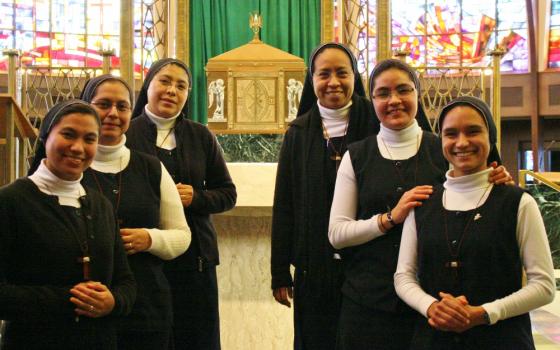Hands-down, the biggest story of the week has been Cardinal Gerhard Müller’s message to the Leadership Conference of Women Religious on April 30.
On a happier note, a group of Mexican sisters in Ohio are knocking on doors to bring Catholics back into the fold. And it’s working.
Call it a crackdown
Mainstream newspapers and TV outlets largely used the Associated Press version of the Müller message. (Read the National Catholic Reporter story here.)
In part, Müller, prefect of the Congregation for the Doctrine of the Faith, told the group’s leaders in no uncertain terms that they were ignoring procedures for choosing speakers for their annual conferences and questioned if their programs were diverging from church teaching.
Without naming her specifically, he referenced Sr. Elizabeth Johnson of Fordham University, a theologian criticized by U.S. bishops and slated to receive a leadership award from LCWR in August.
Müller cautioned that the move will be “seen as a rather open provocation” and reminded the group that its status within the church depends on Vatican approval.
Though the mainstream media largely withheld opinion on the subject, story headlines were pointed:
“American Nuns Get Slapped Down by the Vatican.” (The Atlantic)
“Vatican continues crackdown on U.S. nuns under Pope Francis.” (CBS News)
“U.S. Nuns Crackdown By Pope Francis Targets 'Radical Feminism' And Supporting Homosexuality. (Inquisitr)
“Vatican tightens crackdown on US nuns: Sartain to have 'active role'
That last was on a blog posting by Joel Connelly in the Seattle Post-Intelligencer.
“The Vatican crackdown on U.S. sisters is widely unpopular with American Catholics, particularly the accusation that nuns have spent too much time on social action and not enough on advancing church teaching about such issues as contraception and abortion,” Connelly wrote.
New energy in Columbus
Six sisters from Mexico are making quite an impact at two Catholic parishes in Columbus, Ohio.
The Columbus Dispatch reports that the women have increased the number of people in the pews at Christ the King and St. Stephen the Martyr.
Christ the King’s pastor, the Rev. David Schalk, said the women, who are working primarily with the Spanish-speaking community, personally invite fallen-way Catholics back to the church in a compelling way.
Translation: They knock on people’s doors.
“It’s what Pope Francis has. They are serious about the faith and are able to communicate it in an uplifting way,” said Schalk. “They live very attractive lives – completely consecrated to God – yet there is nothing boring about them.”
The sisters are members of the order of the Missionary Servants of the Word, which does work around the world. Three have served at St. Stephen for about three years. Three more started at Christ the King in November.
Schalk said that one benefit of having the sisters – some of whom are in their 20s – in Columbus is that they interact with younger people and might inspire religious vocations. Each, he said, has “a youthful spirit.”
Undercover nuns
Mark our words: Someone will make a movie out of this someday.
London’s Daily Mail reveals that a group of 450 Spanish nuns joined forces with the city’s Metropolitan Police to help officials uncover slavery and trafficking victims in a first-of-its-kind sting operation.
With help from the plain-clothed nuns, the police rescued 250 kidnapped women in Kensington, Chelsea and Westminster over the past year, the paper reports.
The sisters, mostly from South America, Spain and India, have accompanied officers on late-night raids since January 2013.
The European-funded work was approved by Pope Francis.
“Women from religious orders are in our cars on operations, at the coal face, on the front line,” said Detective Chief Inspector Kevin Hyland.
“The nuns come out with us. We make sure the premises are safe, then the victims are taken to the houses of the nuns.”
The effort has been so unexpectedly successful that plans are being drafted to repeat it in other British towns. The pope’s backing gives authorities hope that the effort could go worldwide.
College students
The Spectrum student newspaper at the University of Buffalo in western New York profiled students considering religious vocations, including Christine Schaefer, a junior history and German major.
And we’re not surprised that the celibacy issue came up quickly – it’s a college newspaper, after all.
Schaefer, who has been considering the religious life for more than a year, told the paper that she found vows of celibacy appealing.
“I know sometimes people are like, ‘Oh my gosh, to be celibate is one of the most intimidating things.’ For me, I haven’t found that intimidating,” she said.
Schaefer is also drawn to the prayerful quality of religious life and believes that prayer can heal the world.
“It sometimes seems like people think if you’re cloistered and cut off from the world, you’re not really doing God’s work,” she said. “But if you’re praying and that’s your mission, it’s so important. It’s hard to see, because we can’t see the spiritual realm, but the power is there. It’s real.”
Time to get green
The Sisters of St. Joseph of Brentwood, N.Y., gathered 28 of its members from around the world last week to talk about environmental threats to the planet.
The women crafted a statement to, in part, encourage the United Nations to take more action on sustainable development, reported Newsday.
They noted that solutions will not be “easy or clear. The world is full of pain and suffering, injustice and acts of inhumanity. Yet we dream of something different, a better world where people care for each other and all of earth’s community.”
The weeklong meeting drew members from Argentina, India, Mexico, Algeria, Chad, England, Australia, Brazil, Italy, Madagascar, Canada, Haiti and the United States.
“We recognize that many current models of development are neither social nor sustainable. They are based on power, efficiency and unsustainable patterns of consumption,” their statement says.
“While continuing to minister to those in need, addressing social, health, educational and spiritual needs, we challenge ourselves to more fully understand the underlying issues that lead to extreme poverty and the degradation of our environment.”
Farewell to Falkirk
The sisters are leaving, and the good-bye isn’t easy.
The only convent in Falkirk, Scotland, has been put up for sale, reports the Falkirk Herald.
The sisters of the Carmelite Monastery of the Immaculate Conception have lived there since 1931. But now that they are joining the Carmelite community in Dysart in Fife, their property is for sale.
“While we are very sad to be leaving Falkirk and so many good friends, we go forward with deep joy and gratitude to God for allowing us this opportunity to continue our apostolate of prayer for everyone in the world within another united and loving community in our own Archdiocese,” said prioress Sr. Mary of St. Joseph.
Monsignor Philip Kerr of St Francis Xavier Church said that, after eight decades in the community, the sisters will be missed.
“The monastery has been a power house of prayer for the last 83 years for Catholics and others and of great spiritual benefit to the community,” he said.
[Lisa Gutierrez is a reporter in Kansas City, Mo., who scans the non-NCR news every week for interesting pieces about sisters. She can be reached at lisa11gutierrez@gmail.com.]

